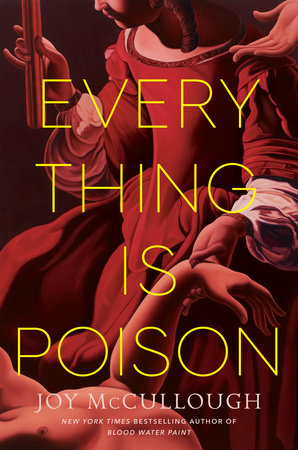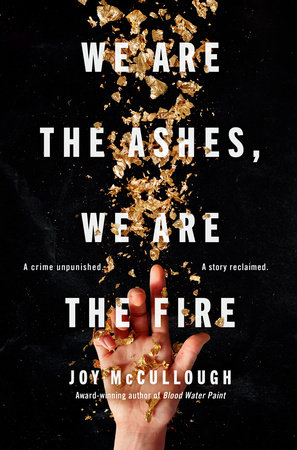
Blood Water Paint
Paperback
$12.99
- Pages: 320 Pages
- Publisher: Penguin Young Readers Group
- Imprint: Penguin Books
- ISBN: 9780735232136
An Excerpt From
Blood Water Paint
Once upon a time
I was a child,
not the woman
of the house.
Not so long ago
but long enough
the days of tugging
on my mother’s skirts
in hopes of being lifted up
at every whim
are hazy round the edges,
like a shadow bleeding
into light.
It’s hazy how,
her belly round
with brothers,
Mother still made room
for me to crawl
up on her lap
to hear a story
no one else would tell.
How she’d look down
and ask me what I thought
of Father’s paintings,
listen to my answer.
It’s hazy how
she made my father
laugh.
How when I’d startle
in the night she’d soothe me
with a tune
to chase away
the monsters.
It’s hazy how
her last few weeks,
confined to bed,
the child inside
a greater weight
than those who came before,
and even when the child arrived
a sister, finally, cold and blue,
and fever dreams bled
into pain laced with delirium,
Prudentia Montone spent
the last of her strength
to burn into my mind
the tales of women
no one else would
think to tell.
Those stories
of a righteous woman,
her virtue questioned
through no fault of her own;
of a widow
with nothing left to lose . . .
No way to tell
where shadow ends
and light begins
but Mother was always
the light.
12.
Light dances on the child’s curls
and whether Father sees
or not
the bond between the baby
and his mother is
perfection.
Twelve years
with my mother
were not enough
but I know how to paint the love,
the source of light.
The final touches that remain
would go unnoticed to an unskilled eye.
In truth, I could release her now.
A signature the final touch,
Orazio Gentileschi,
(never Artemisia)
the client would be satisfied,
and none would be the wiser.
But I would know
her arm is
not quite right.
It wraps around the baby,
yet still looks flat.
Father babbled out
some useless nonsense
when I tried to ask him
how to fix the problem.
I don’t think
he understood
my question.
If he cannot see
the problem to begin with,
how could he ever solve it?
It’s only a commission,
doesn’t even bear my name.
But I’m not only painting the Madonna.
I’m building a ladder,
each new technique,
a rung.
13.
Every time my father shoos me
down the stairs
away from my studio,
each time he speaks to buyers
as though I am not there,
each time they leer at me
as I descend in seething fury,
my mother’s stories
stoke the flames inside.
We mostly deal in Bible tales,
some portraits, ancient histories, myths.
But all the maestros
sign their names
to David, Adam, Moses.
Those who follow strive
to leave their mark as well.
I can paint a David—king or upstart boy,
but when I do
there’s nothing of me
on the canvas.
Susanna, though, is different.
My mother never held a brush
but still composed
the boldest images
from the brightest colors
drawing the eye—the mind—
to what mattered most:
the young woman
stealing a moment
of peace to wash
away the day
then her world,
stained beyond repair.
Susanna and the Elders.
Father’s made attempts at Susanna,
just like the other painters—men—
who think they have the right
to tell the story of a woman
always watched.
But one can’t truly tell a story
unless they’ve lived it in their heart.
The longer I’m shuffled
in and out of the studio,
used for what I can offer,
not what I long to share,
the more certain I am
I can do Susanna justice.
I can do my mother justice.
I can have justice.
But I’m holding back
until I think
perhaps
my skills
can match
my heart.
14.
My arm cradles my palette,
rounded, three-dimensional.
I paint alla prima in my mind
exactly how it should look.
Why then can I not transpose
the image in my mind
the image of my flesh
onto the canvas?
I stare at the Madonna’s
flat, flat arm so long
my eyes begin to blur.
I do not notice
the creak of stairs
moan of door
steps that cross
the studio.
Or perhaps he does not enter
like a mortal man
but appears
fully formed
a miraculous apparition.
Then:
a breath
upon my cheek.
Not Father’s breath.
I grope for hiked-up skirts,
fling endless, heavy layers
of propriety
toward my ankles.
I am a model Roman girl
(or I can play the part at least).
The man averts his eyes,
steps back to give me space,
as though he doesn’t realize
his mere presence in this room
drives out all air.
He may as well
be pressed against me.
He did not mean to startle—
that much is clear.
And even now as I
recover
steady my breath
check my skirts once more
his eyes are not on me
but on the canvas.
My name is Agostino Tassi.
And you are Artemisia.









